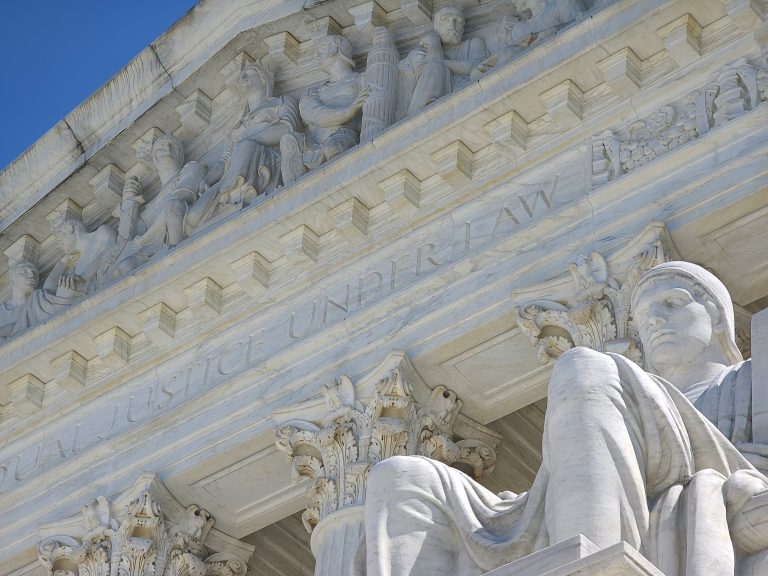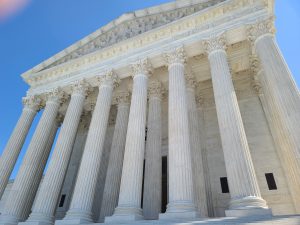The American Civil Liberties Union (ACLU) is backing a federal law barring those subject to domestic violence restraining orders from owning guns.
On Monday, the civil-rights group filed an amicus brief with the Supreme Court supporting the reversal of a Fifth Circuit ruling striking down the prohibition. It argued the federal ban fits within the nation’s history and tradition of firearms regulations and, therefore, passes the test The Court handed down in 2022’s New York State Rifle and Pistol Association v. Bruen. But it also argued the government is asking for too much authority in its argument for upholding the law.
“The United States seeks reversal by asserting sweeping government power to restrict the Second Amendment rights of anyone who is not a law-abiding, responsible, citizen,” the ACLU’s brief in United States v. Rahimi said. “But the Court can and should reverse on a much narrower ground, without granting the government the broad authority it claims: namely, that there is ample historical support for restricting gun rights of persons individually determined to pose a specific threat to others.”
The filing defending a federal law is a bit of a departure for the group, which has traditionally brought or supported cases that seek to block government intrusions against individual liberties. But it also marks one of the first times the left-leaning organization has articulated support for at least some gun rights. That represents something of a turnabout from the brief it filed in Bruen arguing that gun carry represents an infringement on Americans’ First Amendment rights.
The group’s filing comes alongside briefs supporting the federal law from gun-control groups like Everytown for Gun Safety, Giffords, and March for Our Lives. Prominent Democrats, such as California Governor Gavin Newsom and Minnesota Senator Amy Klobuchar, abortion advocates, and domestic violence prevention groups also filed in support of the government’s position. The deadline to file briefs supporting Rahimi’s position has not arrived yet.
The ACLU’s basic argument revolves around the nature and scope of the federal law in question. The group described it as limited in both its reach and duration.
“The limitation on gun possession at issue in this case does not sweep categorically, but applies only to individuals who are subject to specific domestic violence protective orders, and lasts only so long as those orders are in place,” the ACLU wrote.
The group argued laws from the Founding Era through the modern era have allowed the government to disarm people determined to be a specific threat to other individuals or the community at large. It pointed to the sureties that women could take out against their husbands to ensure there would be no further violence inside the home. The group admitted these didn’t function in quite the same way as the modern restraining orders at issue in the case but argued they were close enough to pass muster.
“The court below rejected the surety laws as analogues because they did not impose an absolute ban on weapons possession, but rather a conditional restriction,” the ACLU wrote. “That sort of reasoning, however, effectively requires what this Court expressly rejected: a historical twin. It is sufficient that the surety laws provide historical support for disarming persons based on individualized assessments that they posed a specific threat to others.”
Additionally, the group argued the main reason domestic abusers weren’t subject to gun bans more similar to those seen today is that early Americans didn’t view intermarital violence with the same degree of concern we do now. It also asserted the advancement of firearms technology has caused guns to become more useful and prevalent in domestic violence scenarios. It said that means a broader approach to reasoning by analogy is appropriate in the case.
“[D]omestic violence was not seen as a problem the state should address, except in perhaps the most extreme cases. That has changed today, as illustrated by the amicus briefs filed by various states and the myriad modern-day laws they argue would be called into question by the decision below,” the group wrote. “But because Bruen recognizes that lawmakers can validly impose gun restrictions to address concerns not recognized at the time of the founding and policymakers’ efforts to reduce domestic violence and provide remedies for victims are a modern-day phenomenon, the historical absence of firearms restrictions specifically targeting domestic violence does not render such restrictions categorically unavailable to contemporary lawmakers. States can regulate guns in connection with this problem so long as historical analogues support doing so, even if there were no identical laws at the founding.”
The ACLU rejected the Fifth Circuit’s argument that domestic abusers should be dealt with through criminal prosecution instead of restraining orders, which offer less protection and fewer due process protections for the accused. The group said restraining orders provide more due process protections than some of the historical laws that allowed government officials to disarm people, and they also serve as an essential tool for victims who may be reluctant or unable to pursue criminal charges.
“Firearms restrictions imposed on the basis of civil restraining orders offer victims of domestic abuse substantial benefits over restrictions imposed on the basis of a felony criminal prosecution,” the ACLU wrote. “Chief among these, the civil restraining order system gives victims agency: It allows them to decide when and how to file for an order, securing protection without waiting for the possibility of action by a local prosecutor (who typically maintains considerable charging discretion). By the same token, felony proceedings typically take longer to initiate, leaving at-risk individuals without immediate redress from often-urgent threats. And, because women have more control over the civil process, they can choose to discontinue cases if that best serves their needs. Moreover, a significant percentage of women who experience domestic violence refrain from pursuing criminal charges altogether.”
However, the civil liberties group also noted there are gun laws or law enforcement practices it believes raise constitutional concerns.
“Amicus is by no means a reflexive supporter of firearms restrictions,” the ACLU wrote. “Even putting aside the Second Amendment, such laws raise multiple concerns. Laws that impose severe penalties on individuals for merely possessing a gun contribute to unjust and unnecessary punishment, and help fuel mass incarceration.”
The ACLU has yet to file a brief in a Supreme Court case arguing to overturn any challenged gun law. It’s brief in Rahimi doesn’t either, but it does suggest the group believes some firearms restrictions may be unconstitutional on their face or in how they’re applied.
“Criminal enforcement of gun laws has contributed to the racially disproportionate character of the incarcerated population, undermining promise of equal justice under law,” the ACLU wrote. “Where such laws are enforced selectively on the basis of race, their application violates the constitutional guarantee of equal protection.”
Ultimately, the ACLU concluded the domestic violence restraining order gun ban is not unconstitutional, especially in how it was applied to Rahimi. Still, it urged the Court only to uphold the law under a more limited view than what the government has asked for.
“Because there is historical support for limiting gun possession by individuals adjudged to pose a specific threat to the safety of others, the Court need not—and should not—adopt the United States’ overbroad theory in order to reverse the decision below,” the group wrote. “Accordingly, the ACLU files in support of reversal, but offers a significantly narrower basis for that result.”






